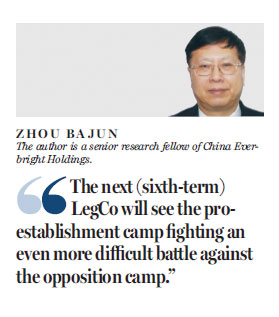Confrontational politics enters new phase
Updated: 2016-09-06 07:55
By Zhou Bajun(HK Edition)
|
|||||||
Zhou Bajun writes that the 2014 'Occupy' movement has spurred the arrival in LegCo of elements that challenge the very foundations of Hong Kong's constitutional status
The 2016 Legislative Council election set a new record in voter turnout of 58 percent, which is 5 percentage points above the turnout rate recorded in the 2012 LegCo poll. It was a sure sign the political awareness of Hong Kong voters has reached a new level - also demonstrating a record number of registered voters in the city's electoral history. There is no better way to show how much the political landscape has changed since the last LegCo election four years ago.
We have witnessed several major political incidents in the past four years. The opposition camp began painstakingly planning and preparing for an illegal movement they called "Occupy Central". This aimed to force the central government to grant their unconstitutional demands by taking Hong Kong's central business district hostage. In a decisive counterstrike, Standing Committee of the National People's Congress (NPCSC) made a historical decision on Aug 31, 2014 on matters concerning Hong Kong's 2017 Chief Executive election by universal suffrage. The opposition camp did not need any more excuses but cited the NPCSC decision as the reason to launch "Occupy" earlier than originally planned, supposedly to pressure the NPCSC to take the Aug 31 decision back.

"Occupy" was something of a watershed event in Hong Kong's history. The "pre-Occupy" opposition camp was generally referred to as the "pan-democrats". When "Occupy" actually began on Sept 28, 2014, a new faction advocating "localism" attracted media attention with a thinly veiled separatist agenda. Its "anti-communist Sinophobia" immediately resonated with older opposition factions despite their different political goals.
The traditional "pan-democrats" aim to turn Hong Kong into an independent political entity while still remaining a special administrative region of China. To do so they have been emphasizing "Two Systems" while avoiding the all-important "One Country" in the "One Country, Two Systems" principle enshrined in the Basic Law. The radical "localist" faction appears to have two distinct pursuits of "self-determination for Hong Kong" and "Hong Kong independence", but both are separatist groups by nature and undoubtedly "pro-independence".
For the "self-determination" faction, "independence" is an option in the "referendum" it seeks for Hong Kong. There are supposedly two other options: "One Country, Two Systems" and "one country, one system", but obviously not for those separatists. "Self-determination" is less straightforward about "independence".
The "pro-independence" faction made an "explosive" move by organizing a very violent protest in Mong Kok on the night of the Chinese New Year in February that has been referred to as the Mong Kok riot. Its leader was arrested and charged with criminal offenses along with dozens of rioters. But he still managed to win 15.4 percent of support in a LegCo by-election in New Territories East only 20 days after the riot. The faction he represents has been no less aggressive in spreading its "pro-independence" cause ever since. Fortunately, the returning officers concerned disqualified the nomination for its leaders in the 2016 LegCo election on a perfectly legal ground.
However, the gate-keeping efforts somehow did not stop a few other "pro-independence" nominees from becoming candidates. Thankfully those separatists all failed to win the LegCo election, but some "self-determination" advocates did win on Sunday's election. This proves the existing LegCo election system allows separatists to gain legislative power despite the fact that the great majority of voters are against "Hong Kong independence". This also means the next (sixth-term) LegCo will see the pro-establishment camp fighting an even more difficult battle against the opposition camp, which now consists of separatists as well as traditional "pan-democrats".
In the coming four years people need to watch out for two critical developments: How those "self-determination" advocates in LegCo will cooperate with the "pro-independence" groups outside LegCo; and how the current SAR government and its successor (after the 2017 Chief Executive election) will stand its ground on Hong Kong's constitutional status and lead Hong Kong society in upholding the "One Country, Two Systems" principle and the Basic Law.
The "pro-independence" groups will no doubt challenge the returning officers' decision to deny its members LegCo election candidacy with a petition for judicial review with the High Court. And the "self-determination" faction is expected to join the traditional "pan-democrats" in supporting such attempts.
The "self-determination" faction is likely to push for a "referendum" with "independence" as the only "real option" through their representatives in LegCo once the sixth-term LegCo is sworn in. Once again the traditional "pan-democrats" in LegCo will have no choice but to stand by those separatists.
If separatist factions resort to violence in the same manner as the Mong Kok riot, the "pan-democrats" are expected to condone it like they did in February. All these scenarios signal even tougher political challenges facing Hong Kong in addition to economic uncertainties in the years to come.
(HK Edition 09/06/2016 page1)